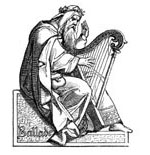
An Autonomous Philosopher & the Mandatum
ACADEMIC FREEDOM BOUND?
My “confession”: I am a professional philosopher who received the bishop’s mandatum. From the perspective of the academy today, such an act signals intellectual suicide or staking a claim in a territory to which I have no epistemic right. My task, as understood by many professional philosophers today, is to follow reason and method wherever they might lead — even unto strange new worlds that exclude moral norms, God, and perhaps human beings as their residents. Two resounding voices seek to persuade the ur-Catholic philosopher to smash his “idolatrous” beliefs for the sake of sound judgment and authentic philosophical pursuits: The first is that of a cadre of self-styled autonomous philosophers who either methodologically exclude God from the scope of reality from the get-go (Heidegger) or whose philosophical methodology excludes God as a consequence of its application (Hume). The second, still more imperious voice is that of the hard-boiled scientist-cum-philosophers (Dawkins) who stridently promote those natural principles that alone will provide a complete explanation of all things without the need to appeal to religious or theological beliefs. The origin of the universe? The resurrection of Jesus of Nazareth? The virgin birth? All are matters for science alone, which enjoys a privileged status as the only reliable means for settling such claims. Under these influences, a philosopher such as myself who has received the mandatum is a philosopher in name only — a rank-and-file dogmatic theologian masquerading as a philosopher. The very concept of the mandatum conjures up in the contemporary imagination visions of inquisitions, indexes, and censors — academic freedom bound. (Of course, Catholics are well within their rights to reject such gross caricatures. After all, along with all the special pleading and hand-waving for “reason,” “objectivity,” “sound judgment,” and “reality” from secularly minded philosophers come many groundless presuppositions accepted simply as either necessary or obvious.)
Caricatures aside, taking the mandatum is apt to give even devout Catholic philosophers pause. After all, religious convictions are deeply embedded and can easily override serious considerations of beliefs that are contrary to them, even in light of concerted attempts at objectivity. It is reasonable to ask whether restrictions such as the mandatum deface the lingua franca of genuine philosophical exchange. Isn’t this a case of philosophical counterfeit?
+++
As a Catholic philosopher, I see the mandatum not as a necessary evil that comes with the territory — namely, a divided house of faith and reason — but as an opportunity to act in solidarity with Holy Mother Church as a principled preserver of reason. In other words, I believe that in receiving the mandatum I have signaled a tough-minded attachment to reason and truth, and a deep commitment to philosophy herself.
The Code of Canon Law states that “those who teach theological disciplines in any institutes of higher studies whatsoever must have a mandate from the competent ecclesiastical authority” (can. 812). In implementing Pope St. John Paul II’s 1990 apostolic constitution Ex Corde Ecclesiae, the United States Conference of Catholic Bishops published “Guidelines Concerning the Academic Mandatum” (2001). Essentially, the mandatum is acknowledgement from a “church authority that a Catholic professor of a theological discipline is teaching within the full communion of the Catholic Church.” Philosophy, because of its role as preambulum fidei, warrants its professors receiving the mandatum, which places on its recipient a “commitment and responsibility to teach authentic Catholic doctrine and to refrain from putting forth as Catholic teaching anything contrary to the Church’s magisterium.”
You May Also Enjoy
Notre Dame's honoring of President Obama was the full flowering of the university's rebellion against the Magisterium of the Church.
The baseline of professional behavior expounded and approved by professors in their trade journal is disturbingly low.
By giving pseudo-legitimacy to the English tyrant, false theologians made possible Henry's theft of Church lands, his dissolution of monasteries, and his wrecking of libraries.

